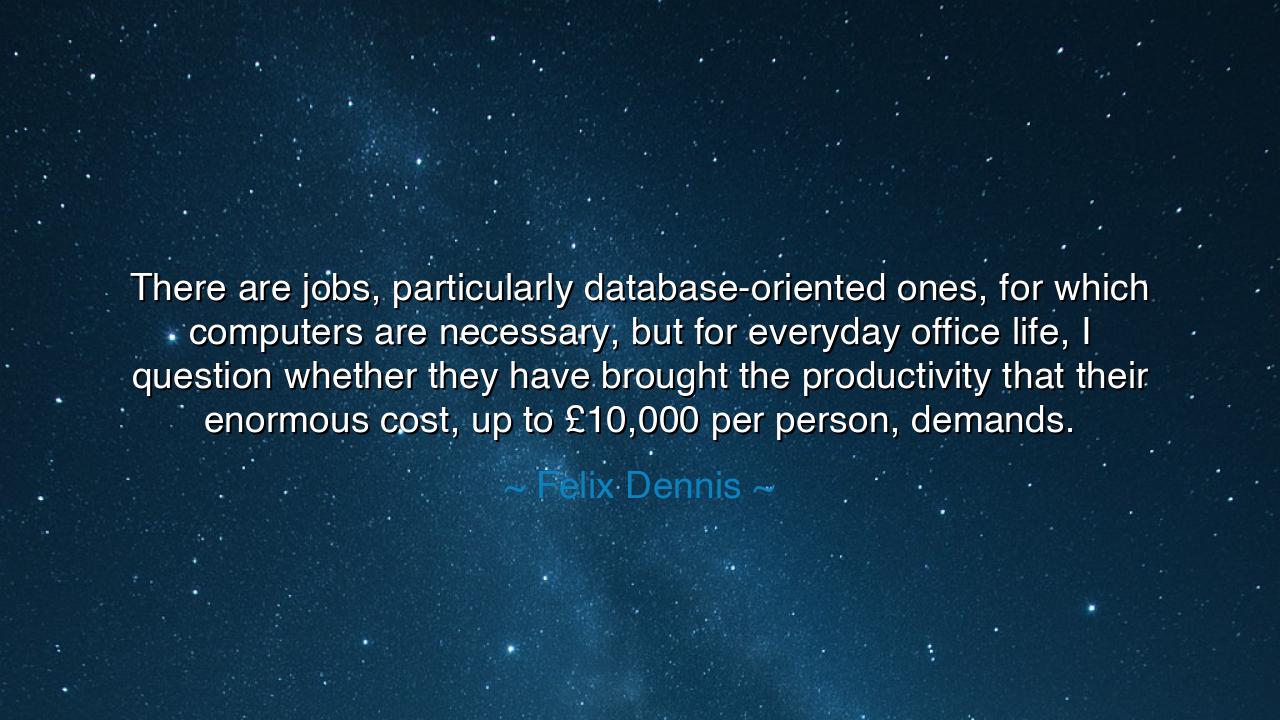
There are jobs, particularly database-oriented ones, for which
There are jobs, particularly database-oriented ones, for which computers are necessary, but for everyday office life, I question whether they have brought the productivity that their enormous cost, up to £10,000 per person, demands.






"There are jobs, particularly database-oriented ones, for which computers are necessary, but for everyday office life, I question whether they have brought the productivity that their enormous cost, up to £10,000 per person, demands." – Felix Dennis
In the dawning days of human civilization, the workplace was simple, governed by the hands and minds of its laborers. From the artisan shaping stone to the scribe writing by candlelight, the tools they used were grounded in the natural world. But as centuries passed, humanity’s reliance on tools grew ever more complex. The machine, once a humble servant to human ingenuity, evolved into the mighty computer, its potential limitless. But Felix Dennis, with the clarity of a modern-day sage, questions the wisdom of this transformation. Has the advent of these machines truly led to greater productivity, or has it distracted us from the true essence of our work?
In ancient times, scribes were the lifeblood of civilization, their knowledge painstakingly written by hand. They transcribed texts of wisdom, recorded laws, and chronicled history, all with nothing more than ink and parchment. Yet their work was not merely mechanical—it was an art, a craft, a connection to something far greater than the task itself. Even as the printing press revolutionized the dissemination of knowledge, it did not diminish the human touch required in the creation of great works. And so, too, does Felix Dennis call upon us to reflect on the cost and value of the tools we use today.
Consider the tapestry of time—how many inventions and tools have promised us that they would change the world for the better, only to fall short of expectations? The steam engine promised endless progress, but it also led to the exploitation of countless souls in factories. The automobile promised a new world of freedom, yet it gave rise to pollution and congestion. Now, the computer, the modern promised land of productivity, claims to unlock infinite possibilities, yet we find ourselves enslaved by the very devices meant to free us. We are constantly connected, always in pursuit of the next update, the next email, the next notification. Has the cost of this connection—both in monetary terms and in time—really been worth the promised efficiency?
The story of Henry Ford, the great industrialist, provides a parallel to Dennis’s insight. Ford sought to revolutionize the automobile industry by embracing automation—yet, for all its technological brilliance, the assembly line was not enough to create a thriving society. Ford understood that true productivity came not from mere mechanization, but from the balance of human and machine. He introduced the $5 workday, offering workers a wage that allowed them to live comfortably. This gesture was not merely an act of charity, but an understanding that human well-being and workplace satisfaction are critical to the long-term success of any enterprise.
Dennis’s words strike at the heart of our modern work culture. In the pursuit of efficiency, we have placed our faith in tools that promise to increase output and reduce effort. Yet, despite their enormous costs—both financial and psychological—the promise of the computer has not always been fulfilled. How often have we sat before the glowing screen, searching for answers and solutions, only to find ourselves distracted by the endless cascade of emails, meetings, and digital noise? How many hours have been lost to technology, time we could have spent in quiet reflection, genuine collaboration, or the focused work that truly moves the needle?
The great lesson here is balance. Technology, like any tool, must serve us, not the other way around. Just as a blacksmith knows that a hammer is useless without the steady hand of the craftsman, so too must we understand that computers are meant to enhance our work, not replace the human touch. There are indeed fields—such as data analysis and complex computations—where computers are invaluable, but in the realm of everyday tasks, we must not be swayed by the promise of productivity at any cost. Wisdom lies in knowing when to embrace technology and when to step away from the machine, allowing human creativity and collaboration to flourish.
To follow this lesson is to live with intention and awareness. We must recognize the true value of the tools at our disposal, using them not as distractions but as aids to our greater purpose. Let us not become slaves to the very tools we have created, but instead, let us wield them with the wisdom of the ancients—carefully, thoughtfully, and with the full recognition that our time and attention are far too precious to be frittered away.






AAdministratorAdministrator
Welcome, honored guests. Please leave a comment, we will respond soon